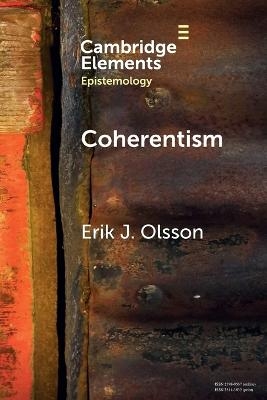
Coherentism
Seiten
2022
Cambridge University Press (Verlag)
978-1-009-05512-3 (ISBN)
Cambridge University Press (Verlag)
978-1-009-05512-3 (ISBN)
The first part of this Element introduces the reader to the main ideas and problems of coherentism. The next part describes the 'probabilistic turn', leading up to recent demonstrations that coherence fails to be conducive to truth. The final part reassesses the current debate about the proper definition of coherence.
Perhaps the most fundamental question of epistemology asks on what grounds our knowledge of the world ultimately rests. The traditional Cartesian answer is that it rests on indubitable facts arrived at through rational insight or introspection. Coherentists reject this answer, claiming instead that knowledge arises from relations of coherence or mutual support: if our beliefs cohere, we can be sure that they are mostly true. The first part of this Element introduces the reader to the main ideas and problems of coherentism. The next part describes the 'probabilistic turn', leading up to recent demonstrations that coherence fails to be conducive to truth. The final part reassesses the current debate about the proper definition of coherence from the standpoint of Rudolf Carnap's methodology of explication. The upshot is a tentative and qualified defence of one of the early coherence measures.
Perhaps the most fundamental question of epistemology asks on what grounds our knowledge of the world ultimately rests. The traditional Cartesian answer is that it rests on indubitable facts arrived at through rational insight or introspection. Coherentists reject this answer, claiming instead that knowledge arises from relations of coherence or mutual support: if our beliefs cohere, we can be sure that they are mostly true. The first part of this Element introduces the reader to the main ideas and problems of coherentism. The next part describes the 'probabilistic turn', leading up to recent demonstrations that coherence fails to be conducive to truth. The final part reassesses the current debate about the proper definition of coherence from the standpoint of Rudolf Carnap's methodology of explication. The upshot is a tentative and qualified defence of one of the early coherence measures.
1. Introduction; 2. Coherentism and the Problems of Epistemology – the Early Debate; 3. The Probabilistic Turn in Coherentist Epistemology; 4. Beyond Conceptual Analysis; 5. Explicating Coherence; 6. Conclusion; References.
| Erscheinungsdatum | 14.09.2022 |
|---|---|
| Reihe/Serie | Elements in Epistemology |
| Zusatzinfo | Worked examples or Exercises |
| Verlagsort | Cambridge |
| Sprache | englisch |
| Maße | 152 x 229 mm |
| Gewicht | 121 g |
| Themenwelt | Geisteswissenschaften ► Philosophie ► Erkenntnistheorie / Wissenschaftstheorie |
| ISBN-10 | 1-009-05512-7 / 1009055127 |
| ISBN-13 | 978-1-009-05512-3 / 9781009055123 |
| Zustand | Neuware |
| Haben Sie eine Frage zum Produkt? |
Mehr entdecken
aus dem Bereich
aus dem Bereich
die Grundlegung der modernen Philosophie
Buch | Softcover (2023)
C.H.Beck (Verlag)
18,00 €
Buch | Softcover (2023)
Reclam, Philipp (Verlag)
7,00 €


![Was heißt Denken?. Vorlesung Wintersemester 1951/52. [Was bedeutet das alles?] - Martin Heidegger](/media/113619842)